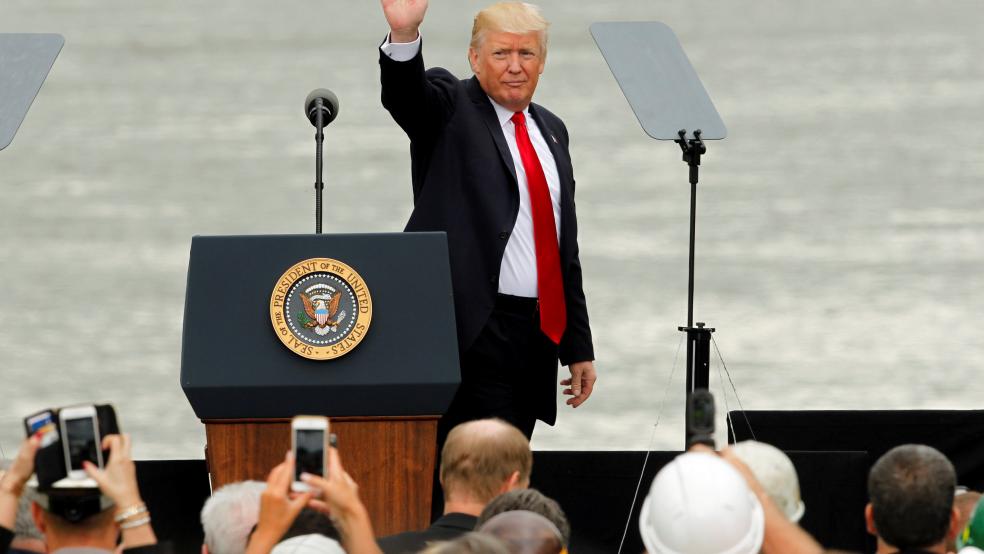Senior Republicans, including his own vice president-elect, seem very reluctant to get behind President-elect Donald Trump’s promise to slap a 35 percent tax on goods sold by American manufacturers who shift production -- and jobs -- overseas.
Trump had laid out his position in a series of tweets Sunday morning, saying, “The U.S. is going to substantially reduce taxes and regulations on businesses, but any business that leaves our country for another country, fires its employees, builds a new factory or plant in the other country, and then thinks it will sell its product back into the U.S. without retribution or consequence, is WRONG!”
Related: The Campaign Promise Congress Won’t Let Trump Keep
He continued, “There will be a tax on our soon to be strong border of 35% for these companies wanting to sell their product, cars, A.C. units etc., back across the border. This tax will make leaving financially difficult, but these companies are able to move between all 50 states, with no tax or tariff being charged. Please be forewarned prior to making a very expensive mistake! THE UNITED STATES IS OPEN FOR BUSINESS.”
On Tuesday, Indiana governor and incoming vice president Mike Pence appeared on MSNBC’s Morning Joe program and was pressed on whether or not he supports Trump’s proposed punitive tax -- more properly called a tariff, because it would be applied to imports as they come into the country.
“Well, I'm for us putting everything on the table in negotiations, in renegotiating [the North American Free Trade Agreement] and in negotiations with other countries,” he said, dodging the question.
Asked repeatedly whether or not he supports Trump’s call for a company-specific tariff, Pence again and again refused to answer the question plainly.
Related: Why Both Trump and Obama Are Wrong About How to Save American Jobs
“Well, what we don't want to do is for companies to say: It costs this much to manufacture overseas and sell it in the United States, and it costs this much in taxes and regulations and other burdens to manufacture here in the United States ... We've got to put the American worker and American jobs first. But that's a belief in the free market.”
Pence isn’t the only top GOP leader who has had to work to avoid associating themselves with a proposal that many conservatives see as an abrogation of the free market principles that the party has long preached.
House Speaker Paul Ryan, talking to a reporter in his home state of Wisconsin on Monday, also demurred when asked about direct support for Trump’s plan, but seemed to suggest he would pursue alternate ways of keeping jobs in the U.S.
“I think we can get at the goal here, which is to keep American businesses American, build things in America and sell them overseas. That can be properly addressed with comprehensive tax reform.”
Related: Why Blue States Are the Big Winners in Trump’s Tax Plan
House Majority Leader Kevin McCarthy (R-CA) took a similar position, preferring tax reforms to tariffs. “I think that's a better way of solving the problem than getting into a trade war with a 35 percent tariff,” he said.
Tariffs are a longstanding fixture in U.S. trade policy, dating back to the founding of the republic, when the bulk of the revenue supporting the federal government came from duties charged on imported goods. They persist to this day as part of U.S. trade policy, on products as diverse as running shoes and horseshoes.
Through the years, tariffs have been imposed as either a punitive measure against foreign competitors seen as engaging in unfair trade practices or as the implementation of straight-up protectionist policies meant to advantage U.S. manufacturers over foreign companies. Frequently, the distinction between the two uses has been unclear.
Tariffs also don’t always have the impact their proponents want. The infamous Smoot-Hawley Tariff Act of 1930, for example, was meant to boost the U.S. economy at the beginning of the Great Depression. However, when countries around the world retaliated with their own tariffs on U.S. exports, the effect on U.S. companies and the overall economy was devastating.
Related: How Donald Trump Can Grow the Economy and Keep His Promise
The trend in U.S. politics in recent decades has been toward liberalization of trade, not its restriction. And the party that has generally been the biggest supporter of trade deals is the GOP, which sees them as good for business and economic growth.
However, Trump has taken a very different position. In his Sunday morning tweets, he specified exactly what he proposes for companies that defy his demand that they remain in the U.S.
In his campaign for the presidency, Trump upended the traditional Republican position, coming out as a caustic critic of the Trans-Pacific Partnership trade deal, which the Obama administration spent years negotiating with a dozen other Pacific nations. This, oddly, put Trump closer to staunch anti-TPP candidate Bernie Sanders, the independent senator from Vermont who ran for the Democratic nomination, than to the Republican establishment.
Trump, to be sure, has been able to bend the GOP to his will on many things. Whether he will be able to overcome the party’s general bias in favor of free trade and allowing businesses to make decisions free from government interference will be a heavier lift than most. It would require GOP leaders to line up in direct opposition to many of its traditional allies -- specifically, business groups like the Club for Growth.
“Tax cuts and deregulation will make the American economy great again, but tariffs and trade wars will make it tank again,” Club for Growth president David McIntosh said in a statement Monday. “The president-elect is spot on when he calls for cutting taxes and federal regulations, but 35-percent tariffs would be devastating to consumers and businesses.”





